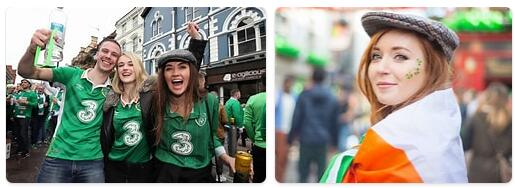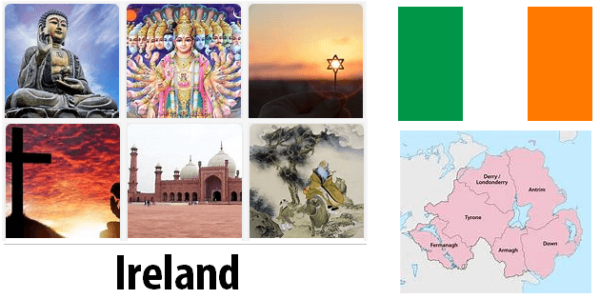About 90 percent of the population of Ireland belongs to the Catholic Church, but there are also Anglicans (3 percent) and other Christians (1 percent), including Presbyterians and Methodists. The remaining are supporters of other religions (3 percent) or non-religious.
The Catholic Church in Ireland has four archdiocese and 26 dioceses. Anglicans have two archdiocese and 11 dioceses. Christian schools offer Christian education adapted to the confession of the children.

History
The Anglican Church was a state church until 1869, when church and state were separated. During the nationalist struggle for secession from Britain, the Catholic Church was a natural rallying point supporting the struggle of the people. It had almost full support and strong indirect power. With the formation of the new republic in 1922, the church gained great power over the legislation. Several constitutional changes in the 1920s and 1930s were characterized by Catholic ideology, such as the prohibitions on divorce and birth control (1935). The role of the church was further strengthened in the revised Constitution of 1937. Catholicism was early institutionalized in the school system, and its ideological influence resulted, among other things, in the criminalization of “immoral” fiction, such as James Joyce, and literature on child restraint.
Although the Catholic Church in the 1980s and 1990s strongly engaged in current political issues, including the legalization of abortion (referendums 1983 and 1992) and divorce (referendum 1986 and 1995), its position has changed dramatically. The church has lost much of its direct political power, including as head of educational policy and practice, and as the premier of sexual moral ideology and practice. The changes started in earnest towards the end of the 1960s, and coincide with the momentum of modernity in Ireland, the emergence of the new women’s movement and its demands for change, and from 1973 with the EU membership.
The abolition of the hegemony of the Catholic Church does not mean that the Irish no longer define themselves as Christians. Still, up to 90 percent of the population wants to keep the Catholic rituals associated with birth, marriage and death, and although new generations are less religiously active than their predecessors, Ireland, compared to other European states, is still a distinct Catholic nation.
In March 2014, it was revealed that all incoming and outgoing telephone calls to the country’s police stations since the 1980’s and up to November 2013 had been recorded. The scandal cost Justice Alan Shatter the office. He retired in April. It also cost Fine Gael support in the municipal elections and the EU elections in May. In the municipal elections, Fine Gael returned 10.7% to 24.0%. Fine Gael was no longer the largest party in the municipalities, it was Fianna Fáil. The winner of the election was Sinn Fein, who rose 7.4% to 15.2%. At the EU elections, Fine Gael returned 6.8% to 22.3%, but retained its four mandates. Sinn Fein, who had 0 mandates before, in turn got 3 elected and thus became the second largest party in terms of mandate. Britain’s attempt to discredit the party by arresting its chairman,Gerry Adams in Northern Ireland in April gave back.
In April 2014, President Higgins conducted a state visit to the United Kingdom. The first ever by an Irish president. In December, the president conducted a state visit to China.
In September, the Ministry of Health issued new guidelines for granting abortions. Human rights organizations and the UN Human Rights Council had already previously criticized Ireland’s restrictive access to abortion. With the new rules, abortion could still not be granted, even if it was a rape, incest or serious threat to the mother’s life or fetal malformation.
In December 2014, Sinn Fein chairman Gerry Adams should have visited Gaza, but the Israeli authorities refused him entry. Adams stated that he was not surprised by the Israeli authorities’ behavior, but disappointed. Ireland, which has been occupied by Britain for centuries, has widespread solidarity with Palestine and in 2014 recognized the country as an independent state.
Also in December, the government announced that it was reopening the case of the “hoods”. In 1978, the European Court of Human Rights issued a ruling on Britain’s treatment of 14 political prisoners wearing hoods in Northern Ireland. The court order stated that there had been no torture. But in 2014, new information emerged revealing that Britain had withheld information from the court that would have proven that Britain used torture against the prisoners.
According to thesciencetutor, President Higgins visited Britain in April 2015. It was the first Irish presidential visit to Britain ever. In December, he visited China on a state visit over a week.
The February 2016 parliamentary election was a stinging defeat for the ruling Fine Gael party, which went back 16 seats to 50 out of the 158-seat parliament. Even worse was Labor’s social democracy, which lost 26 seats and had to settle for 7. The great victor was Fianna Fáil, who more than doubled his mandate from 21 to 44. Sinn Fein was in several polls predicted to become the country’s second largest party, and then also went ahead 9 seats, but had to settle for 23. This left it to decide whether it would go in government. A question that divided the party. In the following months negotiations were held to form a majority government, but in May Fine Gail had to form a minority government based on less than a third of Parliament’s members. There was no basis for forming a majority government with its old heir apparent Fianna Fáil.
In March-April, Ireland celebrated the 100th anniversary of the 1916 Easter uprising, paving the way for independence from British colonial rule.
In June, Britain voted for the UK to leave the EU. A decision that would also have an impact on Ireland, as the two countries would now no longer be in the same community. In addition to the economic consequences for trade between the two countries, the announcement meant that border control would have to be established on the border between Ireland and Northern Ireland.
In June, the United Nations Human Rights Council, in the case of Mellet vs. Ireland, ruled that Irish abortion legislation violated the woman’s right to freedom from inhumane and degrading treatment and the right to non-discrimination. The applicant had to travel to the United Kingdom to have an abortion despite the fetal’s fatal position. It caused her severe physical and mental distress. The Committee found that the suffering was compounded by the stigma that followed from the criminalization of abortion. In November, the Irish authorities agreed to provide plaintiff Amanda Mellet with compensation and advice.
